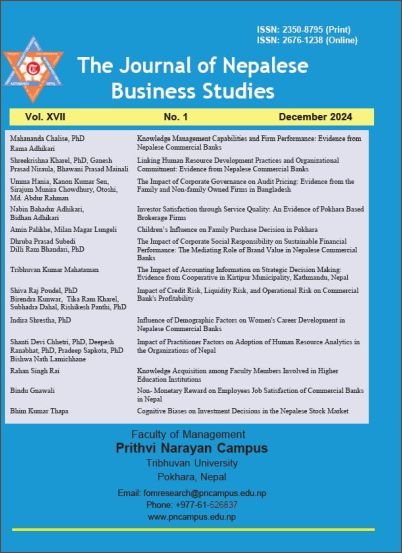Linking Human Resource Development Practices and Organizational Commitment: Evidence from Nepalese Commercial Banks
DOI:
https://doi.org/10.3126/jnbs.v17i1.75254Keywords:
Career advancement, job security, performance management, organizational commitment, training and developmentAbstract
The primary goal of this research is to identify the key HRD practices that link organizational commitment and user predictability. The study employs causal-comparative research design and positivism epistemology. An analysis of associations' effects is done using a cross-sectional survey questionnaire. There were 46508 employees in the survey, and 384 of them were chosen as respondents based on a judgment from ten commercial banks in Nepal. A standardized Likert Scale questionnaire was used to collect data, with 1 denoting strongly disagree and 5 denoting strongly agree. The average Cronbach’s Alpha value for all the variables was 0.77, which has been used as a criterion to evaluate reliability. A total of 430 questionnaires were circulated, and 384 valid responses were collected. SPSS has been used to analyse the data. Regression analysis was used to estimate and forecast the associations. Results reveal that performance management was found to be inconsistent and insignificant, while all other variables that were found to be significant predictors of employee engagement (r2 = 0.648) included training and development, career advancement, and job security. This study also aims to demonstrate the need for proactive, all-encompassing approaches to factor efforts in order to emphasize organizational commitment and ensure alignment with business objectives in Nepalese commercial banks.
Downloads
Downloads
Published
How to Cite
Issue
Section
License
Copyright (c) 2024 Journal of Nepalese Business Studies

This work is licensed under a Creative Commons Attribution 4.0 International License.
This license allows reusers to distribute, remix, adapt, and build upon the material in any medium or format, so long as attribution is given to the creator. The license allows for commercial use.




